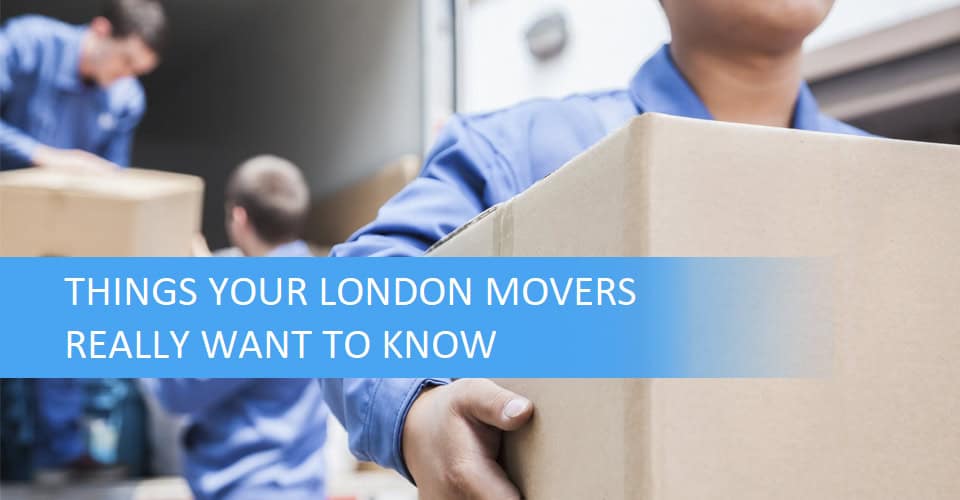3 Things Your London Movers Really Want You to Know

Moving can be a pretty stressful experience. With so much to think about, remember and plan for the home you are leaving and the home you are moving to, it often becomes a little overwhelming. Like any major city, London comes with its quirks; however, knowing what to expect when moving and what will make the experience as smooth as possible will help turn your move into the adventure you are craving. Let’s delve into the things your London movers really want you to know.
Movers are paid to make your move as smooth as possible. For them to do their job, they need you to be ready for them on moving day and have all your boxes labelled. Stay nearby to assist with questions and notify the movers of what to expect at your new location, including passage width, parking facilities, and anything that will affect the move.
To get the most out of the service, your London movers provide, be sure to put in the work before moving day. Your moving company is there to move your items from your current home to your new one. Their work should be quick and efficient, and you can make that happen. With all you have to remember and think about before you move, we have put together a short explanation of what your London movers really want you to know.
1. Be Packed Before Moving Day
 When London movers really open up, the biggest gripe many have is when clients are not done packing by the time your movers arrive. While they do understand the stress and difficulty in packing, moving companies typically have tight schedules and often need to move a few clients in a day. If you are still throwing your goods into unmarked boxes and bags when they are there, you will likely cause them to be late for their following clients.
When London movers really open up, the biggest gripe many have is when clients are not done packing by the time your movers arrive. While they do understand the stress and difficulty in packing, moving companies typically have tight schedules and often need to move a few clients in a day. If you are still throwing your goods into unmarked boxes and bags when they are there, you will likely cause them to be late for their following clients.
To be well prepared for moving day, purchase or source boxes for your goods. Pack the least used items first, label the boxes and store them out of the way. It is a great idea to begin this process as far in advance as possible. Work in this way until you are left with the bare necessities that can be packed into your last, pre-labelled box on the day of the move.
If you want to be a super mover, create a checklist of boxes and include which contain delicate or fragile items. Being well prepared will put you in a good position to inform your movers which packages require extra care.
Another way to ensure you are ready and packed before moving day is to clear your refrigerator of any perishable foods in good time. You can do this by planning your shopping and meals for a few weeks leading up to your moving day. Try to only purchase what you need for the specific meals on your plan. By doing that, you will ensure an empty refrigerator in time for the move. If you are left with a few tasty items in the refrigerator, consider packing them into delicious snacks for the trip to your new home or to enjoy as you start to unpack.
Remember to defrost your refrigerator before moving day. Nobody wants to experience a soggy mess on the other side. Not only could you end up damaging your own boxes and furniture, but also the movers’ equipment. Depending on your contract, you may just be liable for that.
2. Be Mindful Of Your Movers’ Regulations
Most moving companies have rules about what they can and cannot transport for you. Professional companies will notify you of their regulations when you book them; however, we have included a few regularly prohibited items to keep in mind as you start planning your packing.
Items that are typically not allowed by your London movers:
 Hazardous materials. These include cleaning materials, fireworks, nail polish remover, acids, weapons, paint, thinners, and anything else flammable.
Hazardous materials. These include cleaning materials, fireworks, nail polish remover, acids, weapons, paint, thinners, and anything else flammable.- Live animals and humans. The inside of a moving van can be hazardous and uncomfortable. This is not a safe method of transporting animals or people.
- Since moving vans often experience extremes in temperature, and furniture and boxes often slide and fall inside, it is not safe to transport plants. Your moving company also does not need the extra work of cleaning up potting soil once they have unloaded your goods at your new home.
- Perishable foods. These foods attract pests and can cause a mess in a moving van. They are likely to spoil during the trip, so it is best to use all your perishable food before the move or transport it yourself if possible.
- Valuables and electronics. While your movers are most likely trustworthy, they will not accept responsibility for valuable items such as family heirlooms, jewellery, computers, tablets, and the like. For peace of mind not only for you but also for your movers, transport those yourself in a safe and stress-free manner.
We know the temptation of trying to sneak a few prohibited into your boxes. While we are all for going against the system when necessary, we do advise against your movers’ rules. The items your movers have prohibited are banned for a reason. That reason is usually the safety of your goods and furniture and the people handling them.
3. Communicate With Your London Movers
 Your movers will typically have most things under control. Still, they do appreciate a head’s up about as much information as possible for the move. Not only do you need to communicate about certain boxes and where you would like them placed in your new home, but you also need to communicate about the logistical aspects of the move. Booking movers in advance will certainly help them.
Your movers will typically have most things under control. Still, they do appreciate a head’s up about as much information as possible for the move. Not only do you need to communicate about certain boxes and where you would like them placed in your new home, but you also need to communicate about the logistical aspects of the move. Booking movers in advance will certainly help them.
Let your movers know, before moving day, about parking issues, particularly narrow hallways, service elevators they may be allowed to use, how many flights of stairs they will need to take, back entrance access, and if your street is narrow.
On the topic of logistics, it is vital that you get any permits needed for the van to be parked at your current and new home. Let your movers know before the time that you have the permits in order so that they know what to expect.
Another way you can communicate with your movers is while they are in your home. You know your home and your furniture best, so be sure to chat to your movers about particularly heavy or awkward pieces.
Please don’t feel that you need to help with lifting and loading. Still, it does help your movers if you are nearby and accessible to give information and answer questions.
Conclusion
Moving to, from, or within London can be a smooth experience. Pay attention to the information your movers provide and be sure to work toward your moving day so that you are well prepared. Pack your items safely into boxes and label the boxes before the day of the move. Remember to transport dangerous, live, and valuable goods separately and defrost your refrigerator after emptying it.
Keep the communication channels open with your movers, and keep in mind that there are things beyond anyone’s control. If your movers are held up in London traffic or are delayed because of manoeuvring a large van in the city, try to remain calm and patient. If you work toward moving day with a clear vision in mind, the day will go off with as little stress as possible.
If you enjoyed reading this, please come visit Transport Executive for more.
References
- https://manwithavan.co.uk/blog/5-things-your-london-movers-really-want-you-to
- knowhttps://www.activemyhome.com/5-things-london-movers-want-you-to-know/

